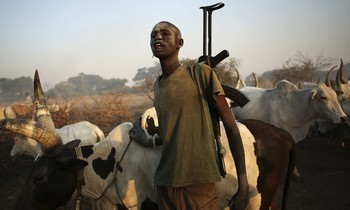At least 116 people were killed and 141 others injured in clashes involving soldiers and civilians in Tonj East County of Warrap State over the weekend as organized forces began the disarmament exercise.
Speaking to Radio Tamazuj on Monday, Executive Director for Tonj East Makuei Mabior Dhuol said: “On the side of civilians, 82 people were confirmed dead, 93 others were injured while on the side of the army, 34 soldiers were killed and 48 others were wounded. The numbers may increase because people are still collecting dead bodies.”
Makuei said the fight started on Saturday between a group of youths and soldiers in Romic Market after a soldier ordered a young man to remove a piece of cloth from his head, a handkerchief commonly worn by local youths from cattle camps.
“The fighting escalated after the soldier killed the young man who refused to remove a piece of cloth from his head. Relatives of the deceased went and attacked the military barracks,” he explained.
The official said the fighting that continued for two days was controlled on Sunday.
The executive director further said the injured were taken to Marialou Hospital for treatment. Mabior pointed out that the military vacated the area to defuse tensions.
Bona Panek Biar, the governor of Warrap State, confirmed the incident saying the numbers of those killed may rise or decrease.
He, however, said investigations are underway to establish the actual cause of clashes between the military and civilians.
For his part, Lul Ruai Koang, the SSPDF spokesperson also confirmed the incident, but could not provide details about the casualties.
He said the issue first occurred between the police and civilians, but local youths assumed their person was killed by the army, prompting them to attack the military barracks at Rumabuth.
In July, the South Sudan People’s Defense Forces (SSPDF) announced a plan to carry out a disarmament exercise in Warrap State and neighboring areas.
Last week, the South Sudan Action Network on Small Arms said that the communities may resist disarmament if the government does not offer them and their cattle enough protection.




